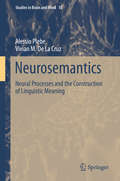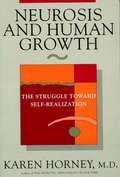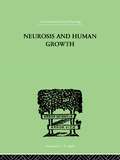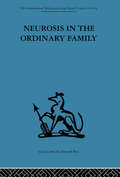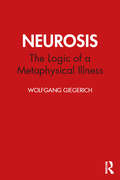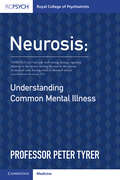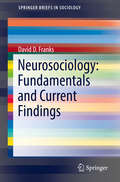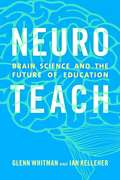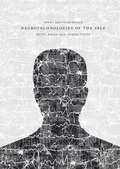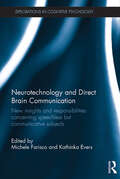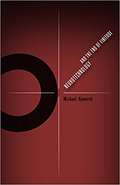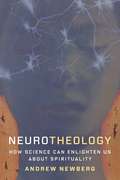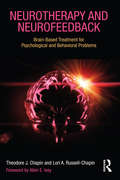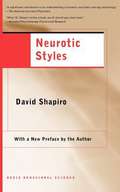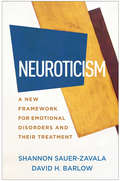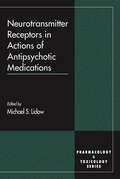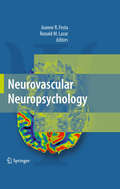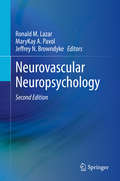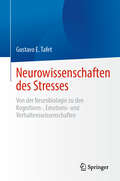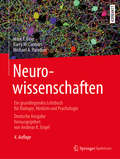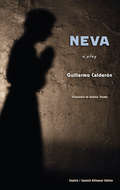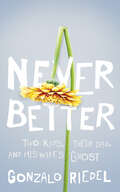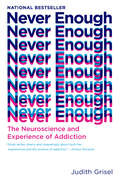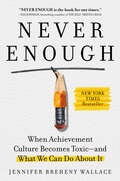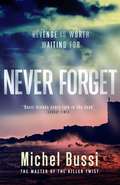- Table View
- List View
Neurosemantics
by Alessio Plebe Vivian M. De La CruzThis book examines the concept of " Neurosemantics", a term currently used in two different senses: the informational meaning of the physical processes in the neural circuits, and semantics in its classical sense, as the meaning of language, explained in terms of neural processes. The book explores this second sense of neurosemantics, yet in doing so, it addresses much of the first meaning as well. Divided into two parts, the book starts with a description and analysis of the mathematics of the brain, including computational units, representational mechanisms and algorithmic principles. This first part pays special attention to the neural architecture which has been used in developing models of neurosemantics. The second part of the book presents a collection of models, and describes each model reproducing specific aspects of the semantics of language. Some of these models target one of the core problems of semantics, the reference of nouns, and in particular of nouns with a strong perceptual characterization. Others address the semantics of predicates, with a detailed analysis of colour attributes. While this book represents a radical shift from traditional semantics, it still pursues a line of continuity that is based on the idea that meaning can be captured, and explained, by a sort of computation.
Neurosis and Human Growth: The Struggle Toward Self-Realization
by Karen HorneyDr. Horney discusses the neurotic process as a special form of the human development, the antithesis of healthy growth. She unfolds the different stages of this situation, describing neurotic claims, the tyranny or inner dictates and the neurotic's solutions for relieving the tensions of conflict in such emotional attitudes as domination, self-effacement, dependency, or resignation.
Neurosis and Human Growth: The struggle toward self-realization (International Library Of Psychology Ser.)
by Karen HorneyIn Neurosis and Human Growth, Dr. Horney discusses the neurotic process as a special form of the human development, the antithesis of healthy growth. She unfolds the different stages of this situation, describing neurotic claims, the tyranny or inner dictates and the neurotic's solutions for relieving the tensions of conflict in such emotional attitudes as domination, self-effacement, dependency, or resignation. Throughout, she outlines with penetrating insight the forces that work for and against the person's realization of his or her potentialities. First Published in 1950. Routledge is an imprint of Taylor & Francis, an informa company.
Neurosis in the Ordinary Family: A psychiatric survey
by Anthony RyleTavistock Press was established as a co-operative venture between the Tavistock Institute and Routledge & Kegan Paul (RKP) in the 1950s to produce a series of major contributions across the social sciences. This volume is part of a 2001 reissue of a selection of those important works which have since gone out of print, or are difficult to locate. Published by Routledge, 112 volumes in total are being brought together under the name The International Behavioural and Social Sciences Library: Classics from the Tavistock Press. Reproduced here in facsimile, this volume was originally published in 1967 and is available individually. The collection is also available in a number of themed mini-sets of between 5 and 13 volumes, or as a complete collection.
Neurosis: The Logic of a Metaphysical Illness
by Wolfgang GiegerichPsychoanalysis began over a century ago as a treatment for neurosis. Rooted in the positivistic mindset of the medicine from which it stemmed, it trained its empiricist gaze directly upon the symptoms of the malaise, only to be seduced into attributing it to causes as numerous as there are aspects of human experience. Edifying as this was for our understanding of the life of the psyche, it left the sickness of the soul that was its actual subject matter, the neurosis which it was supposed to be about, out of its purview. The crux of this problem was of a conceptual nature. As psychology increasingly gave up on its constituting concept, its concept of soul, it succumbed to the same extent to treating its patients without an adequate concept of what both it and neurosis were about. Attention was paid to mishaps and traumas, the vicissitudes of development, and the Oedipus complex. But neurosis, according to the thesis of this ground-breaking book, comes from the soul, even is soul; the soul in its untruth. Indeed, both it and the modern field of psychology are successors of the soul-forms that preceded them, religion and metaphysics, with the difference that psychology's reluctance to recognize and take responsibility for its status as such has been matched by the neurotic soul's clinging to obsolete metaphysical categories even as the often quite ordinary life disappointments of its patients are inflated with absolute importance. The folie à deux has been on a massive scale. Owing their provenance to the supplement they each provide the other, psychology and neurosis are entwined in a Gordian knot, the cutting of which requires insight into the logic that pervades both. Taking up this sword, Giegerich exposes and critiques the metaphysics that neurosis indulges in even as he returns psychology to the soul, not, of course, to the soul as some no longer credible metaphysical hypostasis, but as the logically negative life of the mind and power of thought. Using several fairy tales as models for the logic of neurosis, he brilliantly analyses its enchanting background processes, exposing thereby, in a most lively and thoroughgoing manner, the spiteful cunning by which the neurotic soul, against its already existing better judgement, betrays its own truth. Topics include the historicity of neurosis, its soulful purpose as a general cultural phenomenon, its internal logic, functioning, and enabling conditions, as well as the Sacred Festival drama character of symptomatic suffering, the theology of neurosis, and ‘the neurotic’ as the figure of modernity's exemplary man. A collection of vignettes descriptive of various kinds of neurotic presentation routinely met with in the consulting room is also included in an appendix under the heading, ‘Neurotic Traps.’
Neurosis: Understanding Common Mental Illness
by Peter TyrerCommon mental illnesses have been diagnosed separately in recent years, but what is seldom understood is that they are all linked together, often much more closely than other disorders. In particular, combined anxiety and depression linked to personality disturbance, generally known as neuroticism, is very common. In the absence of awareness of its importance, this frequently leads to wrong clinical decisions and poor outcomes for patients. This book focuses on the concept of neurosis, tracing its history as a concept, its abolition from the DSM, the purpose and importance of the Nottingham Study of Neurotic Disorder, the re-definition of neurosis as the general neurotic syndrome, and its recently updated evidence base. Written for psychiatrists, psychologists and researchers, this book shows how recognising these combined common disorders is absolutely necessary for mental health practice, and urges that it is time that we re-examine our treatment priorities.
Neurosociology: Fundamentals and Current Findings (SpringerBriefs in Sociology)
by David D. FranksThis book offers an introduction to the fundamentals of neurosociology and presents the newest issues and findings in the field. It describes the evolution of the brain and its social nature. It examines the concept of knowing and what can be known, as well as the subjective sensations we experience. Next, it explores the ubiquitousness of New Unconsciousness and the latest conclusions about mirror neurons. Additional themes and concepts described are sex differences in the brain, imitation, determinism and agency.The book brings together neuroscience and sociology, two fields that are very different in terms of method, theory, tradition and practice. It does so building on the following premise: If our brains have been forged evolutionarily over the many centuries for social life, sociologists should have the opportunity, if not the duty, to know about it whatever the reservations of some who think that any approach that includes biology must be reductionistic.
Neuroteach: Brain Science and the Future of Education
by Glenn Whitman and Ian KelleherNeuroteach was therefore written to help solve the problem teachers and school leaders have in knowing how to bring the growing body of educational neuroscience research into the design of their schools, classrooms, and work with each individual student.
Neurotechnologies of the Self
by Jonna BrenninkmeijerTaking care of oneself is increasingly interpreted as taking care of one's brain. Apart from pills, books, food, and games for a better brain, people can also use neurotechnologies for self-improvement. This book explores how the use of brain devices to understand or improve the self changes people's subjectivity. This book describes how the effects of several brain devices were and are demonstrated; how brains and selves interact in the work of early brainwave scientists and contemporary practitioners; how users of neurofeedback (brainwave training) constitute a new mode of self that is extended with a brain and various other (physiological, psychological, material, and sometimes spiritual) entities, ∧ how clients, practitioners and other actors (computers, brain maps, brainwaves) perform a dance of agency during the neurofeedback process. Through these topics, Jonna Brenninkmeijer provides a historical, ethnographical, and theoretical exploration of the mode of being that is constituted when people use a brain device to improve themselves.
Neurotechnology and Direct Brain Communication: New insights and responsibilities concerning speechless but communicative subjects (Explorations in Cognitive Psychology)
by Michele Farisco Kathinka EversNeurotechnology and Direct Brain Communication focuses on recent neuroscientific investigations of infant brains and of patients with disorders of consciousness (DOC), both of which are at the forefront of contemporary neuroscience. The prospective use of neurotechnology to access mental states in these subjects, including neuroimaging, brain simulation, and brain computer interfaces, offers new opportunities for clinicians and researchers, but has also received specific attention from philosophical, scientific, ethical, and legal points of view. This book offers the first systematic assessment of these issues, investigating the tools neurotechnology offers to care for verbally non-communicative subjects and suggesting a multidisciplinary approach to the ethical and legal implications of ordinary and experimental practices. The book is divided into three parts: the first and second focus on the scientific and clinical implications of neurological tools for DOC patient and infant care. With reference to these developments, the third and final part presents the case for re-evaluating classical ethical and legal concepts, such as authority, informed consent, and privacy. Neurotechnology and Direct Brain Communication will appeal to researchers and postgraduate students in the fields of cognitive science, medical ethics, medical technology, and the philosophy of the mind. With implications for patient care, it will also be a useful resource for clinicians, medical centres, and health practitioners.
Neurotechnology and the End of Finitude (Posthumanities #45)
by Michael HaworthA bold philosophical investigation into technology and the limits of the human A daring, original work of philosophical speculation, Neurotechnology and the End of Finitude mounts a sustained investigation into the possibility that human beings may technologically overcome the transcendental limits of possible experience and envisages what such a transition would look like. Focusing on emergent neurotechnologies, which establish a direct channel of communication between brain and machine, Michael Haworth argues that such technologies intervene at the border between interiority and exteriority, offering the promise of immediacy and the possibility of the mind directly affecting the outside world or even other minds. Through detailed, targeted readings of Kant, Freud, Heidegger, Croce, Jung, and Derrida, Haworth explores the effect of this transformation on human creativity and our relationships with others. He pursues these questions across four distinct but interrelated spheres: the act of artistic creation and the potential for a technologically enabled coincidence of idea and object; the possibility of humanity achieving the infinite creativity that Kant attributed only to God; the relationship between the psyche and the external world in Freudian psychoanalysis and Jungian analytical psychology; and the viability and impact of techno-telepathic communication. Addressing readers interested in contemporary continental philosophy and philosophy of technology, media and communications, and science and technology studies, Neurotechnology and the End of Finitude critically envisions a plausible posthuman future.
Neurotheology: How Science Can Enlighten Us About Spirituality (Routledge Science And Religion)
by Andrew NewbergReligion is often cast in opposition to science. Yet both are deeply rooted in the inner workings of the human brain. With the advent of the modern cognitive neurosciences, the scientific study of religious and spiritual phenomena has become far more sophisticated and wide-ranging. What might brain scans of people in prayer, in meditation, or under the influence of psychoactive substances teach us about religious and spiritual beliefs? Are religion and spirituality reducible to neurological processes, or might there be aspects that, at least for now, transcend scientific claims?In this book, Andrew Newberg explores the latest findings of neurotheology, the multidisciplinary field linking neuroscience with religious and spiritual phenomena. He investigates some of the most controversial—and potentially transformative—implications of a neurotheological approach for the truth claims of religion and our understanding of minds and brains. Newberg leads readers on a tour through key intersections of neuroscience and theology, including the potential evolutionary basis of religion; the psychology of religion, including mental health and brain pathology; the neuroscience of myths, rituals, and mystical experiences; how studies of altered states of consciousness shed new light on the mind-brain relationship; and what neurotheology can tell us about free will. When brain science and religious experience are considered together in an integrated approach, Newberg shows, we might come closer to a fuller understanding of the deepest questions.
Neurotherapy and Neurofeedback: Brain-Based Treatment for Psychological and Behavioral Problems
by Lori A. Russell-Chapin Theodore J. ChapinThe fields of neurobiology and neuropsychology are growing rapidly, and neuroscientists now understand that the human brain has the capability to adapt and develop new living neurons by engaging new tasks and challenges throughout our lives, essentially allowing the brain to rewire itself. In Neurotherapy and Neurofeedback, accomplished clinicians and scholars Lori Russell-Chapin and Ted Chapin illustrate the importance of these advances and introduce counselors to the growing body of research demonstrating that the brain can be taught to self-regulate and become more efficient through neurofeedback (NF), a type of biofeedback for the brain. Students and clinicians will come away from this book with a strong sense of how brain dysregulation occurs and what kinds of interventions clinicians can use when counseling and medication prove insufficient for treating behavioral and psychological symptoms.
Neurotic Styles (The Austen Riggs Center Monograph Series #No.5)
by David ShapiroThis new edition of one of the books most closely identified with clinical psychology since 1965 will expose a new generation to Shapiro's stunningly defining conceptualizations of the Obsessive-Compulsive, Paranoid, Hysterical, and Impulsive ways of being.
Neuroticism: A New Framework for Emotional Disorders and Their Treatment
by David H. Barlow Shannon Sauer-ZavalaNeuroticism--the tendency to experience negative emotions, along with the perception that the world is filled with stressful, unmanageable challenges--is strongly associated with anxiety, depression, and other common mental health conditions. This state-of-the-art work shows how targeting this trait in psychotherapy can benefit a broad range of clients and reduce the need for disorder-specific interventions. The authors describe and illustrate evidence-based therapies that address neuroticism directly, including their own Unified Protocol for transdiagnostic treatment. They examine how neuroticism develops and is maintained, its relation to psychopathology, and implications for how psychological disorders are classified and diagnosed.
Neurotransmitter Receptors in Actions of Antipsychotic Medications (Handbooks in Pharmacology and Toxicology)
by Michael S. LidowYears of extensive investigation into neurophysiology, neurochemistry, and behavioral pharmacology have produced an understanding of antipsychotic medication action that is much more refined than the original dopamine hypothesis. New perspectives offer an array of novel drugs - drugs that pose a lower risk of developing tardive dyskinesia, have few
Neurovascular Neuropsychology
by Joanne Festa Ronald Lazar J. P. MohrNeurovascular diseases and conditions, and their associated risk factors, represent a significant cause of cognitive disability in the United States and throughout the world. In the USA alone there are 750,000 new strokes each year, representing the number one cause of disability in the country. Hypertension, found in approximately 50 million Americans, has been shown to be associated with alterations of cognitive function, even in the absence of stroke and dementia. Recent studies of neurovascular disease have now revealed that neuropsychological function may be a more sensitive measure of brain integrity than coordination, motor or sensory function and correlates will with functional outcome measures. Neurovascular Neuropsychology focuses on focal and diffuse neurovascular disease in addition to systemic conditions in which cognition and behavior have been uniquely associated with different pathologic states. With an increasing number of patients being treated by healthcare professionals, Neurovascular Neuropsychology will prove to be a strong reference to consult in regards to neuropsychological syndromes.
Neurovascular Neuropsychology
by Ronald M. Lazar MaryKay A. Pavol Jeffrey N. BrowndykeThis book covers the explosion of new information about the relationship between the brain and its blood supply since the first edition was published in 2009. With new knowledge and its impact on clinical care, neurovascular neuropsychology has become a recognized sub-specialty that has been integrated into health care systems in the US and abroad. The second edition brings to this larger audience the latest word on these matters, with new emphasis on women’s issues, relevance to the pediatric population, insights from modern imaging, and advances in medical and surgical treatments such as heart transplantation, cardiovascular transarterial therapies, and noninvasive brain stimulation in connection with neurocognitive outcomes.
Neurowissenschaften des Stresses: Von der Neurobiologie zu den Kognitions-, Emotions- und Verhaltenswissenschaften
by Gustavo E. TafetDieses Lehrbuch bietet eine Einführung in das interdisziplinäre Studium von Stress und hilft Studierenden und Fachleuten, die wichtigsten neurobiologischen und psychologischen Ursachen und Folgen von Stress beim Menschen zu verstehen. Es zielt darauf ab, das Konzept von Stress auf verschiedenen Ebenen zu verstehen, von den Auswirkungen von Umweltstressoren bis zu seiner Verarbeitung im Gehirn und von den neuronalen Mechanismen, die an dieser Verarbeitung beteiligt sind, bis zum Ausdruck verschiedener adaptiver Reaktionen. Alle diese neuronalen Mechanismen werden auf verschiedenen Komplexitätsebenen klar erläutert, von der neurobiologischen Ebene, einschließlich der zellulären und molekularen Mechanismen, bis zur psychologischen Ebene, einschließlich der kognitiven und emotionalen Verarbeitung und der Verhaltensäußerungen.Der Inhalt ist fundiert und wird von anschaulichen Grafiken begleitet, die Details sehr hilfreich verdeutlichen und somit eine vollständige Integration aller dargestellten Konzepte ermöglichen. Darüber hinaus werden klinische Ausdrucksformen von Stress, wie z.B. Stimmungs- und Angststörungen, ausführlich behandelt. Auch erhalten Sie einen Überblicks über verschiedene Faktoren der Anfälligkeit und Widerstandsfähigkeit, wodurch ein einzigartiger und grundlegender Einblick in dieses interdisziplinäre Gebiet geboten wird. Aufgrund seines interdisziplinären Ansatzes bietet Neuroscience of Stress: From Neurobiology to Cognitive, Emotional and Behavioral Sciences (Von der Neurobiologie zu den Kognitions-, Emotions- und Verhaltenswissenschaften) Studierenden und Fachleuten aus verschiedenen Bereichen der Verhaltens- und Gesundheitswissenschaften eine umfassende und klare Einführung in die Erforschung von Stress und ist bestens geeignet für den Einsatz in einer Vielzahl von Studiengängen, die sich mit psychischer Gesundheit und Wohlbefinden befassen, u. a. in den Bereichen Gesundheit und klinische Psychologie, Gesundheitsförderung undKrankheitsprävention, Psychiatrie und Verhaltensmedizin.
Neurowissenschaften: Ein Grundlegendes Lehrbuch Für Biologie, Medizin Und Psychologie
by Mark F. Bear Michael A. Paradiso Monika Niehaus-Osterloh Barry W. Connors Andreas K. Engel Andreas HeldDer perfekte Einstieg in die Neurowissenschaften – ideal zum Verstehen und LernenSeit vielen Jahren zählt diese didaktisch durchdachte, verständlich geschriebene und hervorragend illustrierte Einführung international zu den führenden Lehrbüchern im Bereich der Neurowissenschaften. Das moderne Grundlagenwerk richtet sich an Studierende der Biologie, der Medizin und der Psychologie gleichermaßen. Die wieder von Andreas Engel herausgegebene deutsche Ausgabe ist an die hiesige Studiensituation angepasst und stellenweise erweitert. Der Bogen spannt sich von der Anatomie des Gehirns bis zur Sinnesphysiologie, von der Entwicklungsbiologie bis zum Verhalten, von den Störungen des Nervensystems bis zur Kognitionswissenschaft, von den molekularen Mechanismen bis zu den neuen bildgebenden Verfahren. Ein eigenständiger „Bildatlas der menschlichen Neuroanatomie“ erlaubt dem Lernenden, seine Kenntnisse der Hirnstrukturen zu überprüfen und zu erweitern. Jedes Kapitel endet mit Verständnisfragen und Übungsaufgaben sowie einer Zusammenstellung wichtiger weiterführender Literatur. In spannenden Exkursen berichten renommierte Wissenschaftler, wie sie zu ihren entscheidenden Entdeckungen kamen. So führt das Buch den Leser von den Grundlagen zu den aktuellen Forschungsthemen des Faches.In der durchgehend aktualisierten 4. Auflage sind unter anderem neue Forschungsergebnisse zu Optogenetik, Konnektomik, tiefer Hirnstimulation, molekularer Medizin und Neuroökonomie eingearbeitet worden. Zahlreiche neue oder aktualisierte Abbildungen veranschaulichen in bewährter Manier die im Text beschriebenen Prozesse, Strukturen und Methoden. Wer Neurowissenschaften in ihrer ganzen Bandbreite verstehen will, ist mit "dem Bear" bestens bedient. Den drei Verfassern des Buches gelingt, womit Lehrbuchautoren im deutschsprachigen Raum sich nach wie vor schwer tun: anschaulich und spannend den Leser vom Einstieg in die Grundlagen bis an die vorderste Front der Forschung mitzunehmen und ohne überflüssigen Ballast wissenschaftliche Erkenntnis mehr erzählend als erklärend zu vermitteln … Ein didaktisches Meisterwerk ist nun topaktuell auch in deutscher Sprache neu aufgelegt verfügbar. Aus dem Vorwort von Prof. Andreas K. Engel, Universitätsklinikum Hamburg-Eppendorf
Neva: English/Spanish
by Guillermo Calderón Andrea Thome"Guillermo Calderón is an authentic genius of the theater . . . you can't say you've heard or seen any of it before, which may make you want to hear and see it again."--The New Yorker"Neva's neobrutalist punch demonstrates . . . the enduring power of art."--Time Out New York"Brilliant and provocative."--TheatreMania"A lovely, disturbing drama . . . Calderón's drama is Chekhovian in the best sense."--The Village VoiceThis politically charged, haunting yet humorous meditation on theater and the revolutionary impulse tells the story of three actors, including Anton Chekhov's widow, who gather to rehearse scenes from The Cherry Orchard as Russia faces an impending revolution. A savage examination of the relationship between theater and historical context, Neva is the author's first play, which he directed for its English language premiere at the Public Theater in New York City.Guillermo Calderon is Chile's foremost contemporary theater artist. His plays include Diciembre (December), Clase (Class), Villa, Discurso (Speech), Quake, and Escuela (School), and his productions have toured extensively through South America and Europe. His co-written screenplay Violeta won the World Cinema Jury Prize for Drama at the 2012 Sundance Film Festival, and other awards include Best Play of the Year (Art Critics Circle of Chile), three Chilean Altazor Awards for Best Playwright and Best Director, and the 2010 Bank of Scotland Angel Award (Edinburgh Fringe Festival).
Never Better: Two Kids, Their Dad, and His Wife's Ghost
by Gonzalo RiedelHis wife died before their second son turned one. How can he keep her memory alive when there’s so much he wants to forget?There was a time before his wife got sick when Gonzalo could think about other things. They had full lives where death didn’t factor. Where humour was more than a coping mechanism. Life wasn’t all about treatments and recovery, or the emptiness he felt when she died.They had kids together. Young kids. Less than a year after their youngest was born and suddenly he was strapping them both into their car seats to drive to their mother’s funeral.He used to think he was the glue holding the household together. It didn’t take long for him to realize how wrong he’d been. A grieving husband is in no condition to raise kids alone. There were times when he wanted to toss himself into a raging river that would suck him under and bash his skull on the rocks. That’s always an option for another day. For now, he’ll just squash those feelings and drive the kids to daycare.Does it get easier? Of course. But not right away. They say that hope only comes at the end of a long dark journey, but that isn’t entirely true because the journey never really ends. But that means there’s good news: hope is everywhere you look.
Never Enough: The Neuroscience and Experience of Addiction
by Judith GriselFrom a renowned behavioral neuroscientist and recovered drug addict, an authoritative and accessible guide to understanding drug addiction: clearly explained brain science and vivid personal stories reveal how addiction happens, show why specific drugs--from opioids to alcohol to coke and more--are so hard to kick, and illuminate the path to recovery for addicts, loved ones, caregivers, and crafters of public policy.Addiction is epidemic and catastrophic. With more than one in every five people over the age of fourteen addicted, drug abuse has been called the most formidable health problem worldwide. If we are not victims ourselves, we all know someone struggling with the merciless compulsion to alter their experience by changing how their brain functions. Drawing on years of research--as well as personal experience as a recovered addict--researcher and professor Judy Grisel has reached a fundamental conclusion: for the addict, there will never be enough drugs. The brain's capacity to learn and adapt is seemingly infinite, allowing it to counteract any regular disruption, including that caused by drugs. What begins as a normal state punctuated by periods of being high transforms over time into a state of desperate craving that is only temporarily subdued by a fix, explaining why addicts are unable to live either with or without their drug. One by one, Grisel shows how different drugs act on the brain, the kind of experiential effects they generate, and the specific reasons why each is so hard to kick. Grisel's insights lead to a better understanding of the brain's critical contributions to addictive behavior, and will help inform a more rational, coherent, and compassionate response to the epidemic in our homes and communities.
Never Enough: When Achievement Culture Becomes Toxic—and What We Can Do About It
by Jennifer Breheny WallaceThe definitive book on the rise of “toxic achievement culture” overtaking our kids' and parents' lives, and a new framework for fighting back. <p><p> In the ever more competitive race to secure the best possible future, today’s students face unprecedented pressure to succeed. They jam-pack their schedules with AP classes, fill every waking hour with resume-padding activities, and even sabotage relationships with friends to “get ahead.” Family incomes and schedules are stretched to the breaking point by tutoring fees and athletic schedules. Yet this drive to optimize performance has only resulted in skyrocketing rates of anxiety, depression, and even self-harm in America’s highest achieving schools. Parents, educators, and community leaders are facing the same quandary: how can we teach our kids to strive towards excellence without crushing them? <p><p> In Never Enough, award-winning reporter Jennifer Breheny Wallace investigates the deep roots of toxic achievement culture, and finds out what we must do to fight back. Drawing on interviews with families, educators, and an original survey of nearly 6,000 parents, she exposes how the pressure to perform is not a matter of parental choice but baked in to our larger society and spurred by increasing income inequality and dwindling opportunities. As a result, children are increasingly absorbing the message that they have no value outside of their accomplishments, a message that is reinforced by the media and greater culture at large. <p><p> Through deep research and interviews with today’s leading child psychologists, Wallace shows what kids need from the adults in the room is not more pressure, but to feel like they matter, and have intrinsic self-worth not contingent upon external achievements. Parents and educators who adopt the language and values of mattering help children see themselves as a valuable contributor to a larger community. And in an ironic twist, kids who receive consistent feedback that they matter no matter what are more likely to have the resilience, self-confidence, and psychological security to thrive. <p><p> Packed with memorable stories and offering a powerful toolkit for positive change, Never Enough offers an urgent, humane view of the crisis plaguing today’s teens and a practical framework for how to help. <p> <b>New York Times Bestseller</b>
Never Forget: The #1 bestselling novel by the master of the killer twist
by Michel BussiA #1 INTERNATIONAL BESTSELLER A SUNDAY TIMES CRIME BOOK OF THE MONTH'Outrageously entertaining' The Times'A tantalising story that wraps the reader in myriad enigmas - utterly spellbinding'Daily Mail'As exhilarating as Bussi's breakthrough novel After the Crash' The Sunday Times 'Agatha Christie updated and then cranked up to 11: a blast' Shots Magazine REVENGE IS WORTH WAITING FOR... Jamal loves to run. But one morning - as he is training on a path winding up a steep cliff - he stumbles across a woman in distress.It's a matter of seconds: suddenly she is falling through the air, crashing on the beach below.Jamal is only an unlucky bystander - or is he?His version of events doesn't seem to fit with what other eyewitnesses claim to have seen. And how to explain the red scarf carefully arranged around the dead woman's neck?Perhaps this was no accident after all.Or perhaps there is something more sinister afoot - a devilish plan decades in the making, masterminded by someone hell-bent on revenge.MICHEL BUSSI: THE MASTER OF THE KILLER TWISTBeloved by readers... 'I didn't anticipate all the twists and turns in this cleverly plotted novel''The final twist is a bit of a jaw dropper''Twists and turns aplenty!''A twisting, turning story which clobbers you with a number of cracking twists!''Fast-paced and chock full of twists, turns and red herrings' ...and critics 'A novel so extraordinary that it reminded me of reading Steig Larsson for the very first time . . . I doubt I'll read a more brilliant crime novel this year' Sunday Times on After the Crash'A dazzling, unexpected and haunting masterpiece' Daily Mail on Black Water Lilies'Inventive, original and incredibly entertaining' Sunday Mirror on Don't Let Go'Combines an extraordinarily inventive plot with characters haunted by long-ago events - and demonstrates why he has such a hold on readers' Sunday Times on Time is a Killer
